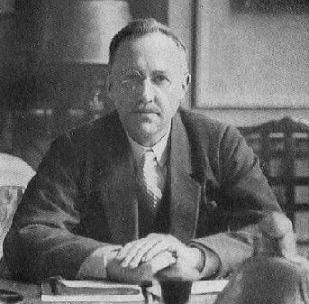 Maria Popova at Brain Pickings has uncovered a fascinating piece by H. P. Lovecraft: the advice he gave to aspiring writers in the January 1920 issue of The United Amateur. His praise for the King James Bible is especially striking:
Maria Popova at Brain Pickings has uncovered a fascinating piece by H. P. Lovecraft: the advice he gave to aspiring writers in the January 1920 issue of The United Amateur. His praise for the King James Bible is especially striking:
It is also important that cheaper types of reading, if hitherto followed, be dropped. Popular magazines inculcate a careless and deplorable style which is hard to unlearn, and which impedes the acquisition of a purer style. If such things must be read, let them be skimmed over as lightly as possible. An excellent habit to cultivate is the analytical study of the King James Bible. For simple yet rich and forceful English, this masterly production is hard to equal; and even though its Saxon vocabulary and poetic rhythm be unsuited to general composition, it is an invaluable model for writers on quaint or imaginative themes.
Popova cuts her excerpt off at this point, but devotees of Appendix N will not want to miss the very next sentence:
Lord Dunsany, perhaps the greatest living prose artist, derived nearly all of his stylistic tendencies from the Scriptures; and the contemporary critic Boyd points out very acutely the loss sustained by most Catholic Irish writers through their unfamiliarity with the historic volume and its traditions.
So… Lovecraft doesn’t merely encourage writers to study the King James Bible for its “rich and forceful English.” He points out that that Lord Dunsany was among the best (if not the best) because of assimilation of its style– and that lesser writers suffered from not being familiar with it! Given how his politics and beliefs tend to be portrayed, this is liable to be a surprise. Those of us experiencing it are having a very similar reaction to what C. S. Lewis described in his essay “On the Reading of Old Books”:
Nothing strikes me more when I read the controversies of past ages than the fact that both sides were usually assuming without question a good deal which we should now absolutely deny. They thought that they were as completely opposed as two sides could be, but in fact they were all the time secretly united—united with each other and against earlier and later ages—by a great mass of common assumptions.
This will not be surprising to longtime fantasy fans, however, because Ursuala K. Le Guin also noted the connection between the King James Bible and Lord Dunsany in her famous essay “From Elfland to Poughkeepsie”:
The King James Bible is indubitably one of the profoundest formative influences on Dunsany’s prose; another, I suspect, is Irish daily speech. Those two influences alone, not to mention his own gifts of delicate ear for speech rhythms and a brilliantly exact imagination, remove him from the reach of any would be imitator or emulator who is not an Irish peer brought up from the cradle on the grand sonorities of Genesis and Ecclesiastes.
Lord Dunsany’s techniques and inspirations thus remained a fairly hot topic from 1920 all the way to 1973– thanks in no small part to Lin Carter’s Ballantine Adult Fantasy series, which Le Guin cites here as being the key to so many classic works coming back into circulation. Lord Dunsany was so influential in the seventies, she had to take time to explain to fantasy novelists that they should really stop trying to channel him! Although he’s relatively obscure today, the fact that Gary Gygax cited him as a significant influence on the creation of AD&D should surprise no one. Nevertheless, the image of H. P. Lovecraft studying the King James Bible in order to better emulate “the greatest living prose artist” of his day is one I’m still trying to wrap my head around…!
It’s just not what I would have expected.
“Lord Dunsany, perhaps the greatest living prose artist, derived nearly all of his stylistic tendencies from the Scriptures”
This certainly accounts for why a lot of his early fantasy reads like holy texts of some alien or lost civilization.
Good writing is good writing, but the soaring prose of the King James Bible remains one of the high points of Western literature.
Ezra Pound, despite his well-known politics, praised John Reed’s Ten Days That Shook the World, a pro-Red account of the Bolshevik revolution in Russia.
I won’t say that a writer who disdains Shakespeare and the KJV is “crippled”, but such wretches are definitely hobbled. Utterly foundational texts.
-
I think it remains true that anyone serious about studying the English language needs to study the KJV and Shakespeare. If I recall correctly, Farnsworth’s Classical English Rhetoric cites frequently from both.
Having grown up with the KJV and given that it seems like pretty much all churches have abandoned it, it hasn’t escaped my notice that none of the newer versions I’ve seen have prose on remotely the same level (which is a shame, because the KJV otherwise has serous issues).
“Nevertheless, the image of H. P. Lovecraft studying the King James Bible in order to better emulate “the greatest living prose artist” of his day is one I’m still trying to wrap my head around…!”
And it makes the removal of H.P. Lovecraft’s statue from the Word Fantasy Awards even more darkly amusing, as he appears to have been more the “honest rational atheist” than the mewling minions within WFA.